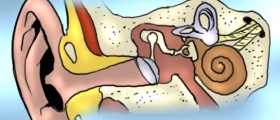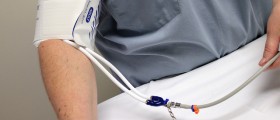
Perforated eardrum and the main symptoms
The condition in question is characterized primarily by a rupture or a hole in the membrane located between the ear canal and the middle ear. This membrane is called the eardrum because it resembles a drum, and it sends the vibrations received from the outer ear to the middle ear. It also serves as a protection for these ear locales. This is why in cases of eardrum rupture, these two parts of the ear are much more susceptible to infections and damage. Some trauma or infection (either bacterial or viral) are the most common culprits for perforated eardrum, but explosions, slaps to the ear or to the side of the head, changes in the air pressure (typical for air traveling and scuba diving, for example), and similar causes can also result in perforated eardrum.
As for the symptoms that might indicate this condition, pain is practically impossible to avoid, but its intensity may vary and it does not necessarily have to be severe. Other signs that are also very likely to be experienced are vertigo, loss of hearing or changes in hearing such as ringing or buzzing, as well as fluid or blood from the ear. Depending on the cause, the presence of the symptoms also varies, as well as their persistence. However, the symptoms that indicate complications that might even be life threatening consist of stiffness in the neck, high fever, very intense headaches, changes in the vision, constant vomiting and difficulty to talk or even open the mouth. These and similar symptoms require immediate medical help
How to deal with perforated eardrum?
Even if a person feels only slight discomfort, it is highly recommended to visit a doctor, particularly if some of the factors that might influence the condition of the ear have been present. The specialist will suggest which tests should be done and based on the results, it will be easier to set the diagnosis and to recommend the appropriate treatment. For example, if some injury is the cause, the treatment will probably consist of pain relievers and antibiotics, because an injury will heal on its own after some time, and it is only important to prevent the infection and relieve the pain, if present. Some perforations tend to close spontaneously and over time, so the doctor might also recommend regular visits in order to monitor the condition. After that, the hearing usually improves on its own and the rest of the symptoms disappear. Sometimes, the surgery might be the only solution, but it is only recommended in severe cases.

















Your thoughts on this
Loading...